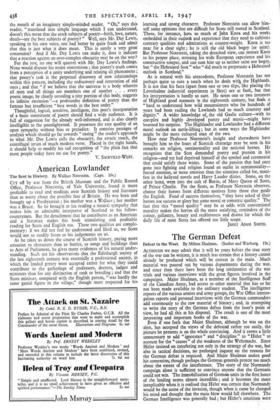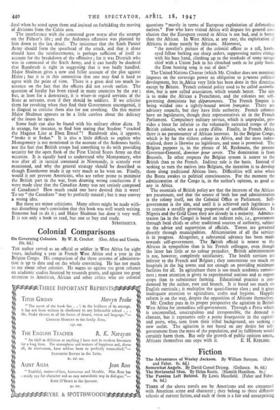The German Defeat
Defeat in the West. By Milton Shulman. (Seeker and Warburg. 15s.)
ALTHOUGH we may admit that it will be years before the true story of the war can be written, it is much less certain that a history cannot already be produced which will be correct in the main. Much material was poured out by various departments during the war, and since then there have been the long testimonies of the war trials and various interviews with the great figures involved in the campaigns. Major Shulman, as a member of the Intelligence Staff of the Canadian Army, had access to other material that has so far not been made available to the ordinary student. The intelligence reports of the various armies and army groups, the War Office interro- gation reports and personal interviews with the German commanders add enormously to the raw material of history ; and; in attempting to write the story of the German defeat from the loser's point of view, he had all this at his disposal. The result is one of the most interesting and important books of the war.
Even if one feels that Major Shulman, although he was on the alert, has accepted the views of the defeated rather too easily, the picture he presents is on the whole convincing. And it seems a little unnecessary to add " ignorance " and " discipline " to " Hitler " to account for the " causes " of the weakness of the Wehrmacht. Since Hider insisted on interfering not only in the strategy of the war, but also in tactical decisions, no prolonged inquest on the reasons for the German defeat is requited. And Major Shulman makes good his contention; though perhaps the German generals protest too much about the extent of the interference. The story of the Normandy campaign alone is sufficient to convince anyone that the Germans could not win. The immobilisation of German units in the first hours of the landing seems almost incredible ; and it becomes the more inexplicable when it is realised tha; Hitler was certain that Normandy would be the scene of the invasion, though when it came he changed his mind and thought that the main blow would fall elsewhere. The German Intelligence was generally bad ; but Hitler's intuitions were
...fatal when he acted upon them and insisted on forbidding the moving of divisions from the Calais area.
The interference with the command grew worse after the attempt on the Fiihrer's life ; and the Ardennes offensive was planned by him down to the last detail. The insistence that the Sixth Panzer Army should form the spearhead of the attack, and that it alone should have the reinforcements, is perhaps sufficient of itself to account for the breakdown of the offensive ; for it was Dietrich who was in command of the Sixth Army, and it can hardly be doubted that Rundstedt is right in suggesting that it was badly handled. Major Shulman gives a new and fuller account of the plot against Hitler ; but it is in this connection that one may find it hard to agree with the point of view. There is a great deal too much in- sistence on the fact that the officers did not revolt earlier. The question of loyalty has been raised in many countries by the war ; but, at least for a democracy, it is wiser-to regard servants of the State as servants, even if they should be soldiers. If we criticise them for revolting when they find their Government uncongenial, it is illogical to criticise them also for not revolting. On this matter Major Shulman appears to be a little careless about the delicacy of the issues he raises.
Some fault can also be found with his military obiter dicta. It is strange, for instance, to fmd him stating that Student " cracked the Maginot Line at Eben Emael "! Rundstedt also, it appears, 4‘ broke it at Sedan." It is also a little difficult to explain why Montgomery is not mentioned in the account of the Ardennes battle, nor the fact that British troops had something to do with providing security for the open flank of the First United States Army on that occasion. It is equally hard to understand why Montgomery, who was after all in tactical command in Normandy, is scarcely ever mentioned, and why the general strategy should be described as though Eisenhower made it up very much as he went on. Finally, would it not prevent Americans, who are rather prone to minimise the British part in the war, from drawing wrong conclusions if it were made clear that the Canadian Army was not entirely composed of Canadians? How much could one have desired that it were! To say " the Canadians " may be perfectly natural ; but it may convey a wrong idea.
But these are minor criticisms. Many others might be made with- out disturbing one's conviction that this book was well worth writing. Someone had to do it ; and Major Shulman has done it very well. It is not only a book to read, but one to buy and study.
STRATEGICUS.



































 Previous page
Previous page